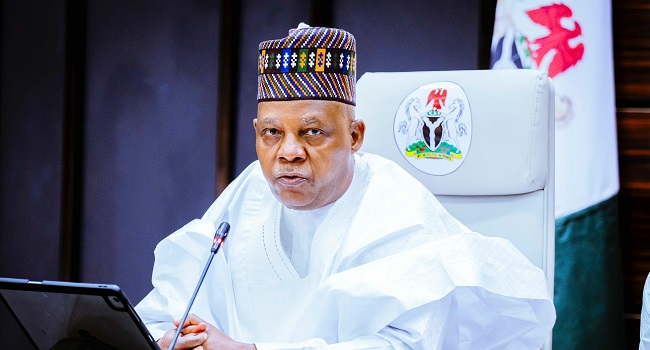Vice-President Kashim Shettima says Nigeria’s federal structure is not the problem, but rather the lack of collective fiscal responsibility.
He spoke on Tuesday at Leadership Newspaper’s annual conference and awards at the State House in Abuja.
Shettima said the problems attributed to the federal system often stem from poor management of resources, not from any inherent flaw in the constitutional architecture.
He noted that the country’s challenge ”lies less in the structure of our federalism and more in the deficit of our collective fiscal responsibility”.
The vice-president said the issue is not merely how much each federating unit accrues, but how such resources are utilised.
He said the administration, under the leadership of President Bola Tinubu, is confronting this challenge directly through reforms.
“We have chosen the path of reform. It is bold, often difficult, but necessary,” Shettima said.
“To those who argue that Nigeria’s federalism is fundamentally flawed because of its fiscal nature, I urge caution. Federalism, as practised around the world, is not a one-size-fits-all system. There is no universal template. Each country’s federal arrangement is shaped by its history, culture, and political experience.”
He also mentioned the pursuit of local government autonomy, which he said is being realised through the sanctity of due legal process.
Shettima also cited examples of federalism in other countries, such as Canada, Germany, and Spain, to show that no federal system is perfect and that each country’s arrangement is shaped by its history, culture, and political experience.
He urged caution against romanticising foreign systems or prescribing imported solutions that fail to account for Nigeria’s distinct social, ethnic, and demographic complexities.
“What we seek, therefore, is not a photocopy of another country’s model, but a federal structure tailored to our aspirations. It must reflect our values, ensure accountability, and foster development at all levels,” he said.
“The only road to such a destination is through sincere dialogue, and this conference is a laudable example.
“The policy choices pursued by this administration-from the removal of fuel subsidies to the introduction of tax reform bills-are aimed not only at guaranteeing a fiscally responsible federation but also at creating a system that offers each state both increased allocations and the opportunity to participate in debates and reforms for long-term fiscal stability.”
Shettima said the greatest threats to Nigeria’s progress have stemmed from the mismanagement of resources and corruption.
He stressed that what matters most to everyday Nigerians is not the abstract theory of federalism, but whether governance delivers basic necessities like water, electricity, schools, roads, and hospitals.








